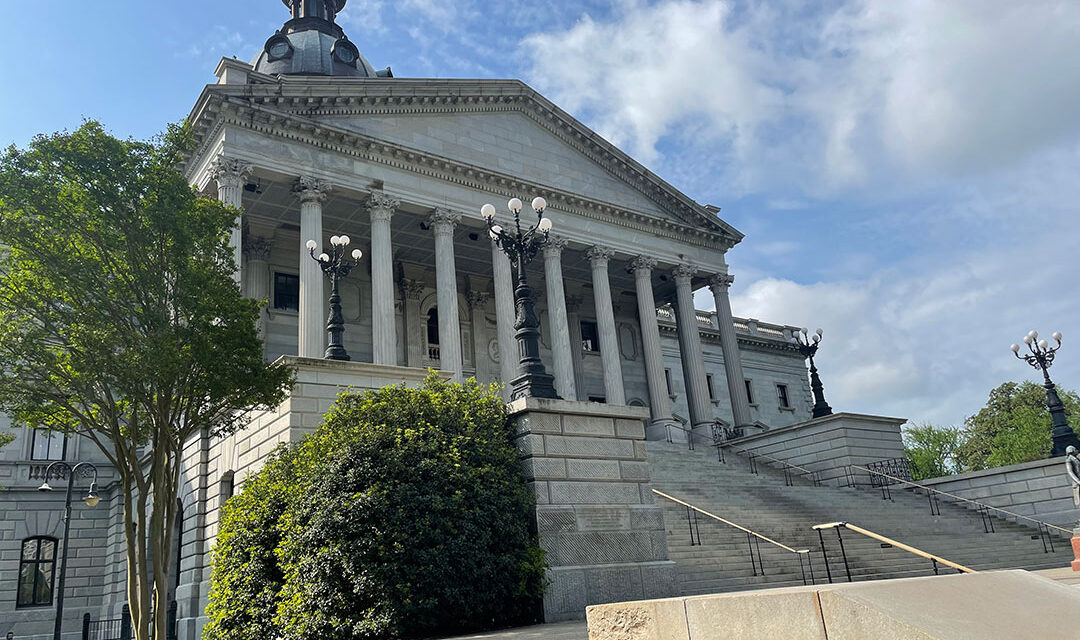Members of the House of Representatives and Senate discuss the proposed bill at the South Carolina State House. (Photo by P.J. Williams)
South Carolina lawmakers are discussing a bill that would guarantee six weeks of paid parental leave for teachers and school employees.
The change would make the state the first in the Southeast to give teachers that much paid time off if passed by the House of Representatives.
The bill would allow school employees who are new parents or are primary caregivers for an adopted child to receive the six weeks off with pay.
Under the bill, a birth parent or the primary caregiver of an adopted or foster child would receive six weeks of paid leave. A spouse or partner-caregiver would receive two weeks of paid leave.
Still, some people think six weeks isn’t enough.
Betsy Portune, a gifted and talented teacher and coordinator at Barnwell School District 29, said sometimes mothers need much more.
“In an ideal world, more paid time would be wonderful since, for mothers, child birth can be incredibly taxing on the body,” Portune, who works at Kelly Edwards Elementary, Williston-Elko Middle School and Macedonia Elementary School, said in an email. “Returning to work at 6 weeks was not an option for me and I had exhausted my sick days before I went out on maternity leave due to my (health) at the beginning of my pregnancy where I was sick for several weeks. If I didn’t have short-term disability, I’m not sure how my husband and I would have managed our bills.”
Teachers organizations, such as the South Carolina Education Association and the Palmetto State Teachers Association, are hopeful the bill will pass.
Palmetto State Teachers, the state’s largest education association, focuses on both keeping and gaining teachers as well as teacher pay and parental leave.
Patrick Kelly, director of government affairs for the organization, said the bill could help immensely with the state’s teacher shortage.
“Ninety-three percent of our members indicated that passing a paid parental leave policy for educators will enhance teacher retention efforts in our state,” he said. “We also know it will enhance teacher recruitment efforts because we will be the first state in the Southeast to offer six weeks of paid parental leave to educators.”
The bill would offer parity for teachers.
The state passed legislation last year that offered six weeks of paid family leave for state employees. But that didn’t cover teachers because they are employees of school districts and not the state.
Lawmakers said teachers who are not using paid parental leave for their pregnancy have another option to receive paid time off.
“Teachers also can use accrued leave … to receive pay during time off, but they have to use their accrued leave” – meaning they would have no leave left for the year, Rep. Neal Collins, R-Greenville, said via email. And districts still have to pay a substitute teacher when a teacher is out. So the bill wouldn’t cost as much as it might seem.
Mahwish McIntosh, an English teacher at Summerville’s Cane Bay High School with two children, said state leaders have to take education seriously if they want to see improvement.
“Districts and the state really have to ‘pony’ up and really, truly support education if they want to see it continue to succeed and improve,” she told The Carolina News & Reporter.
Other teachers try to adjust by trying to pay for their child’s daycare while also juggling with getting back into the classroom.
“If you’re trying to get yourself back to work, and you don’t have a family situation where there’s another family member that’s able to stay home with your infant, you’re actually in a real pickle for daycare,” said Kat Low, a physics teacher at Hanahan High School.
McIntosh said society expects teachers to be sacrificial individuals for the sake of all students.
“It’s a step in the right direction,” she said. “But there are many more to take because we as a state are much further behind in supporting educators than our neighboring states.”
With the state’s teacher retention rate declining, lawmakers are not only hopeful will pass, Collins said.
The House has passed the bill. It moves now to the Senate.




